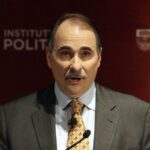Israeli Prime Minister Benjamin Netanyahu was rushed to the hospital early Sunday for an unscheduled emergency pacemaker implant but announced afterward that he was “doing excellently.” The health scare comes as the country is gripped in turmoil and protests, with a crucial vote on judicial reform scheduled in the Knesset on Monday.
Professor Roy Beinart, senior physician and director at the Davidai Arrhythmia Center at Sheba Medical Center’s Heart Institute, said that the patient was doing well:
The implantation went smoothly, without any complications. He is not in a life-threatening condition. He feels great and is returning to his daily routine.
Netanyahu has backed a controversial plan to limit the powers of the nation’s Supreme Court:
The Knesset, where Netanyahu wields a comfortable majority, is due on Monday to hold a ratification vote on a bill limiting Supreme Court powers to overrule some government decisions.
It would be the first reform written into law of a package critics fear aims to curb judicial independence, but which Netanyahu – who is on trial on corruption charges he denies – insists are needed for balance among branches of government. The embattled 73-year-old leader was rushed to a hospital near Tel Aviv late on Saturday after a heart monitor implanted a week earlier in what was described as a dehydration episode detected a “temporary arrhythmia”, his doctors said.
As you can see, many are against the plan:
Even while Netanyahu is in the hospital, legislators continued debate over the matter.
Lawmakers on Sunday began debating the bill, which would amend a law enabling the Supreme Court to void decisions made by the government and ministers it deems “unreasonable”. The result of Monday’s vote could come as soon as that evening.
Protesters view the overhaul as a power grab that will allow abuses by removing a crucial check and balance in a country that has no formal constitution. Supporters, however, think the measure is necessary to rein in an out-of-control Supreme Court. Said 24-year-old student Aviya Cohen:
I am 100% in favour of the judicial reforms. I think my country needs it. I think we absolutely need to go through with it.
The drama is even affecting the country’s national security, with tens of thousands of reservists threatening not to show up for duty.
The crisis has spread to the military, with protest leaders saying thousands of volunteer reservists would not report for duty if the government continues with the plans and former top brass warning that Israel’s war-readiness could be at risk.
Netanyahu has cast the threat of insubordination in the ranks as an attempt to undermine Israel’s elected government.
The military chief, Lieutenant-General Herzi Halevi, wrote in an open letter that “dangerous cracks” are formed when politics impact on the military.
“If we don’t have a strong and united defence force, if Israel’s best do not serve … we will no longer be able to exist as a country in the region,” Halevi wrote.
Netanyahu’s health issues have forced him to cancel plans for trips to Cyprus and Turkey. He did say, however, that he will appear at the Knesset Monday for the crucial vote.


